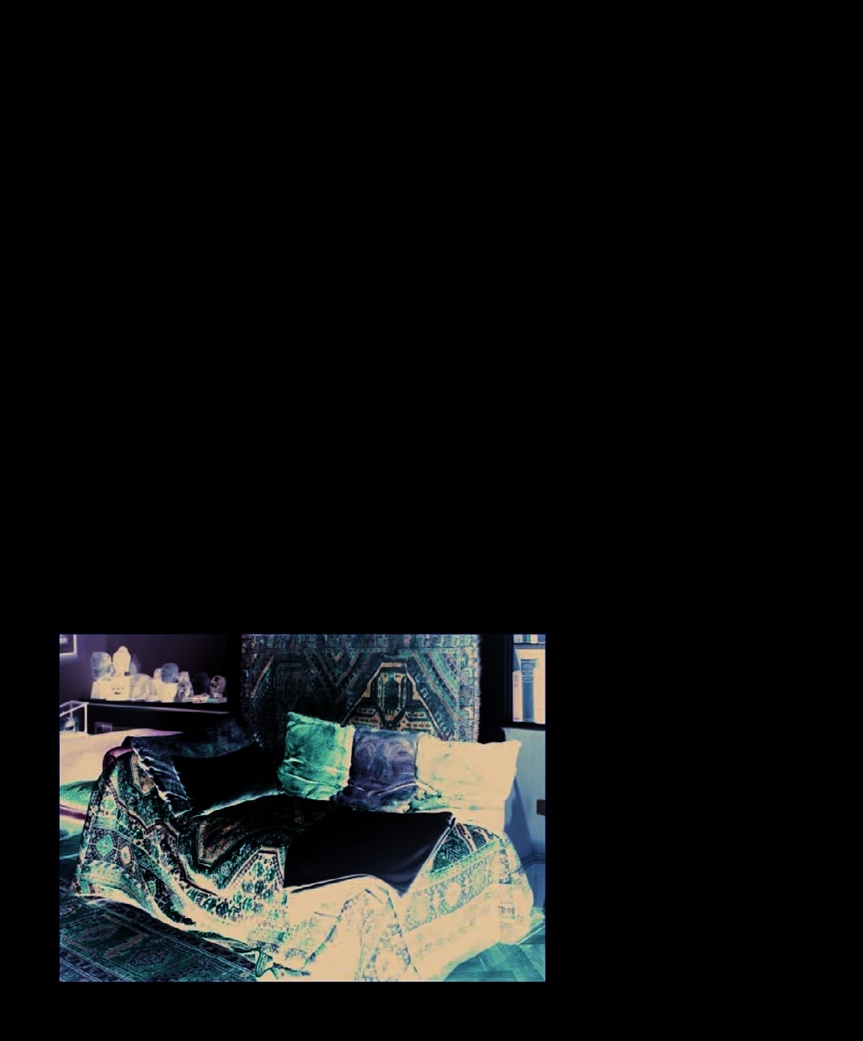The Psychology Book (31 page)
Read The Psychology Book Online
Authors: Unknown

process set free the trapped
at the time. Those who had begun
voicing the thoughts brought them
emotion, and the symptoms
to examine the unconscious feared
to consciousness, allowing the
disappeared. Breuer disagreed with
that it might be filled with psychic
symptoms to disappear. This is
what he felt was Freud’s eventual

PSYCHOTHERAPY 95
See also:
Johann Friedrich Herbart 24–25 ■ Jean-Martin Charcot 30 ■ Carl Jung 102–07 ■ Melanie Klein 108–09 ■
Anna Freud 111 ■ Jacques Lacan 122–23 ■ Paul Watzlawick 149 ■ Aaron Beck 174–75 ■ Elizabeth Loftus 202–07
overemphasis on the sexual origins
powerful dimensions of the
and content of neuroses (problems
unconscious, the warehouse
caused by psychological conflicts),
from which our active cognitive
and the two parted; Freud to
state and behavior are dictated.
continue developing the ideas and
The conscious is effectively the
techniques of psychoanalysis.
puppet in the hands of the
The poets and philosophers
unconscious. The conscious
before me discovered the
Our everyday mind
mind is merely the surface of
unconscious; what
It is easy to take for granted the
a complex psychic realm.
I discovered was the
reality of the conscious, and
Since the unconscious is all-
scientific method by
naively believe that what we think,
encompassing, Freud says, it
which it could be studied.
feel, remember, and experience
contains within it the smaller
Sigmund Freud
make up the entirety of the human
spheres of the conscious and an
mind. But Freud says that the
area called the “preconscious.”
active state of consciousness—
Everything that is conscious—that
that is, the operational mind of
we actively know—has at one
which we are directly aware in
time been unconscious
our everyday experience—is just a
before rising to consciousness.
fraction of the total psychological
However, not everything becomes
forces at work in our psychical
consciously known; much of what
reside in a part of the conscious
reality. The conscious exists at
is unconscious remains there.
mind that Freud called the
the superficial level, to which we
Memories that are not in our
preconscious. We are able to bring
have easy and immediate access.
everyday working memory, but
these memories into conscious
Beneath the conscious lies the
which have not been repressed,
awareness at any time. ❯❯
When ideas, memories, or
…and
stored in the unconscious
impulses are
too overwhelming or
alongside our instinctual drives,
inappropriate
for the conscious mind
where they are not accessible by
to withstand, they are
repressed
…
immediate consciousness.
The difference between our
The unconscious silently
unconscious and conscious thoughts
directs the thoughts and
creates
psychic tension
…
behavior
of the individual.
…that can only be released when
repressed memories are
allowed into
consciousness
through psychoanalysis.

96 SIGMUND FREUD
CONSCIOUS
The mind is like
an iceberg; it floats
EGO
PRECONSCIOUS
with one-seventh
of its bulk above water.
Sigmund Freud
SUPERE
G
ID
UNCONSCIOUS
O
Our psyche
, according to Freud,
resembles an iceberg, with the area of
primitive drives, the id, lying hidden in
the unconscious. The ego deals with
conscious thoughts and regulates
both the id and the superego—our
critical, judging voice.
The unconscious acts as a
energy in a system stays constant
our behavior, directing us
receptacle for ideas or memories
over time; it cannot be destroyed,
toward choices that promise to
that are too powerful, too painful,
only moved or transformed. Freud
satisfy our basic needs. The drives
or otherwise too much for the
applied this thinking to mental
ensure our survival: the need for
conscious mind to process. Freud
processes, resulting in the idea of
food and water; the desire for
believed that when certain ideas
“psychic energy.” This energy, he
sex to ensure the continuation
or memories (and their associated
said, can undergo modification,
of our species; and the necessity
emotions) threaten to overwhelm
transmission, and conversion, but
to find warmth, shelter, and
the psyche, they are split apart from
cannot be destroyed. So if we have a
companionship. But Freud claims
a memory that can be accessed by
thought that the conscious mind
the unconscious also holds a
the conscious mind, and stored in
finds unacceptable, the mind
contrasting drive, the death drive,
the unconscious instead.
redirects it away from conscious
which is present from birth. This
thought into the unconscious, in a
drive is self-destructive and impels
Dynamic thought
process Freud called “repression.”
us forward, though as we do so we
Freud was also influenced by the
We may repress the memory of a
are moving closer to our death.
physiologist Ernst Brücke, who was
childhood trauma (such as abuse
In his later works, Freud moved
one of the founders of the 19th-
or witnessing an accident), a desire
away from the idea that the mind
century’s “new physiology,” which
we have judged as unacceptable
was structured by the conscious,
looked for mechanistic explanations
(perhaps for your best friend’s
unconscious, and preconscious to
for all organic phenomena. Brücke
partner), or ideas that otherwise
propose a new controlling structure:
claimed that like every other living
threaten our well-being or way of life.
the id, ego, and superego. The id
organism, the human being is
(formed of primitive impulses)
essentially an energy system, and so
Motivating drives
obeys the Pleasure Principle, which
must abide by the Principle of the
The unconscious is also the place
says that every wishful impulse
Conservation of Energy. This law
where our instinctual biological
must be immediately gratified: it
states that the total amount of
drives reside. The drives govern
wants everything now. However,

PSYCHOTHERAPY 97
another part of the mental structure,
wonder that humans exist in states
the ego, recognizes the Reality
of anxiety, depression, neurosis,
Principle, which says we can’t have
and other forms of discontent?
everything we desire, but must
take account of the world we live
Psychoanalytical treatment
in. The ego negotiates with the id,
Since the unconscious remains
A man should not
trying to find reasonable ways to
inaccessible, the only way the
strive to eliminate his
help it get what it wants, without
conflicts can be recognized is
complexes, but to get into
resulting in damage or other
through the symptoms that are
accord with them; they are
terrible consequences. The ego
present in the conscious. Emotional
legitimately what directs his
itself is controlled by the
suffering, Freud claims, is the result
conduct in the world.
superego—the internalized voice
of unconscious conflict. We cannot
Sigmund Freud
of parents and society’s moral
continually fight against ourselves,
codes. The superego is a judging
against the uprising of repressed
force, and the source of our
material, and against the force of
conscience, guilt, and shame.
death, without emotional turmoil.
In fact, Freud proposes, the
Freud’s unique approach to the
unconscious holds a vast amount
treatment of psychological ailments
of conflicting forces. In addition
involved working with the conflicts
to the drives of the life and
that existed in the unconscious.
that encourages a patient to lie on
death forces, it encompasses the
He sought to free the patient
a couch and talk. From Freud’s first
intensity of repressed memories
from repressed memories and so
treatments, psychoanalysis has
and emotions, as well as the
alleviate their mental pain. His
been practiced in sessions that
contradictions inherent in our
approach to treatment is called
can sometimes last for hours, take
views of conscious reality alongside
psychoanalytic psychotherapy, or
place several times per week, and
our repressed reality. According
psychoanalysis. This process is
continue for many years.
to Freud, the conflict that arises
not easy or quick. Psychoanalysis
While unconscious thoughts
from these contrasting forces is
is only performed by a therapist
cannot be retrieved through normal
the psychological conflict that
trained in Freud’s specific
introspection, the unconscious can
underlies human suffering. Is it any
approach, and it is his therapy
communicate with the conscious in
some ways. It quietly communicates
via our preferences, the frames of
reference in which we tend to
understand things, and the symbols
that we are drawn to or create.
During analysis, the analyst
acts as a mediator, trying to allow
unspoken thoughts or unbearable
feelings to come to light. Messages
arising from a conflict between the
conscious and the unconscious are
likely to be disguised, or encoded,